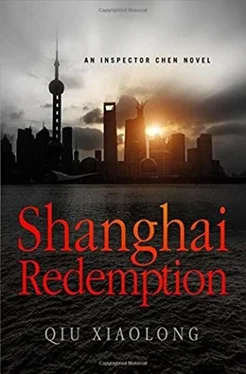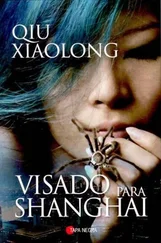He thought he might as well take a short walk, since walking sometimes helped him think. As he walked along Ten Perfections Street, he passed by a local candy shop, which was selling sweet sesame cakes, another favorite from his childhood. Not far away, a rickshaw driver was hawking his services, waving a tourist map in one hand, and a little further down the street, an elderly peddler was displaying colorful paper pinwheels in a holder that looked like a long-handled feather duster.
Chen was in no mood for any of them, nor did his thinking get any clearer as he walked along the busy street. So he gave up and hurried back to his hotel.
Up in his room, he drew himself a bath. Traditionally, a hot bath was how a gourmet would follow up an excellent meal, letting the body relax as the food digested. But Chen had something else in mind. Still at a loss for what to do, he was hoping the hot water would jump-start his brain.
Unsure if he was under close surveillance, he put the CD Qian gave him into a player in the bathroom, to give the impression he was truly indulging himself.
From the speakers, Qian’s soft, sweet voice poured out like rippling water.
Myriads of maple leaves / upon myriads of maple leaves / silhouetted against the bridge, / a few sails return late in the dusk. // How do I miss you? // My thoughts run like / the water in the West River, / flowing eastward, never ending, / day and night .
It was a poem written by the Tang courtesan Yu Xuanji. Her social status in the ninth century was pretty close to the present-day ernai. She got involved in a murder case, quite possibly a crime of passion, and was executed. Centuries later, the Dutch mystery writer Robert van Gulik wrote a novel called Poets and Murder based on the story. But Chen didn’t think van Gulik really appreciated her poetry.
Chen pulled his thoughts back to the present. Who could the man that picked up her cell phone have been? It wasn’t her father, not with that strong Beijing accent, and it wasn’t Sima, whom Chen would have recognized immediately. Was it possible that Qian had talked about Cao, the private detective, to some other man in her life? It seemed unlikely.
The only other conclusion was that the calls made from or to her cell phone were being tapped.
The man said he had Chen’s phone number. His special cell number? He had only given it out to a few: Old Hunter, Peiqin, White Cloud, and Qian.
Panic-stricken, he went over all the calls he’d made and received in the past few days. He had made a point of calling from public phones. Old Hunter was experienced: in spite of the new SIM card, he dialed from public phones. Peiqin had only called him once, and that was to tell him about the ransacking of his mother’s room and her subsequent admission to the hospital. Ultimately, it was a phone call that didn’t really matter, not to anyone who might be listening in, anyway. White Cloud had, as instructed, called him from a public phone, and the only other time they’d spoken on the phone was when he was at her apartment and she had called him there, at her own home number. That left only Qian who called him on his cell the other day, a call that was quite possibly incriminating.
Even though his replacement SIM card wasn’t registered to his name, it was only a matter of time before the “phone police” managed to trace one of his calls to this number. From there, it probably wouldn’t be too difficult to trace any incoming calls.
He jumped out of the tub, dried himself in a hurry, dressed and quickly left the hotel.
He would have to change his phone number again and then let his Shanghai contacts know about the new number in person. It was too risky to call them from his old number.
That meant making another trip back to Shanghai.
But before he left, he had to try to find more out about what was going on with Qian.
She said she lived in an area close to the Temple Market. That was about all he knew, but even if she’d given him her address, it wouldn’t be a good idea for him to go there and ring her doorbell.
At a newsstand on Ten Perfections Street, he bought several new SIM cards, and then stepped into another public phone booth and dialed her cell phone number.
“Who is it?”
It was the same Beijing-accented voice that had answered her cell phone the last time. Chen hung up.
IT WAS GOING TO be another busy day, Yu thought, when he woke up.
It was still quite early when he heard Peiqin slip out of the room lightfootedly. Her long-standing morning routine was to get to the food market before six a.m., and then back home to prepare the breakfast for the family. Lately, though, she hadn’t been getting up that early, what with Qinqin staying at his college dorm during the week, and her going to bed later, after staying up surfing the Internet.
The moment she closed the door, he sat up and reached for the case files. Taking out a pack of cigarettes, he hesitated, but then lit one. He started reading over the files yet again.
About six twenty, Peiqin came back with a basketful of vegetables, fish, and a live chicken.
“Is someone coming for dinner?” he asked, quickly moving the ashtray out of sight.
“No, it’s for Chen’s mother. She’s checking out of hospital today. So I’m cooking something for her.”
“That’s a good idea. How is she doing? You didn’t tell me much about how she’s coping.”
“There’s nothing really wrong with her, but she was badly scared. She’s a frail old woman, and the doctor is concerned. He’s not sure her heart could stand that kind of shock again.”
“That worries me too. Whoever is after Chen will not let him go so easily.”
“Then whatever happens next, no one can tell,” she said, taking a plastic container out of the basket. “Oh, I almost forget. I also bought soy milk for you, fresh from the market. Drink it. And the earthen oven cake too. Eat it while it’s still hot.”
He took a bite of the cake. “Another question. You’ve been spending a lot of time online. Have you found anything special?”
“About your boss?”
“Or anything related to Chen, even remotely related.”
“Well, I haven’t seen much about the police department, but there seems to be a lot of chatter about Red Prince Lai and his campaign of red revolutionary songs,” she said, perching herself at the edge of the bed and breathing into the cup of soy milk in her hand. “You know I’m not interested in politics, but those red songs give me goosebumps. I remember how, during the Cultural Revolution, I trembled, along with my black parents, the moment those red songs started blaring from the street loudspeakers. Are we really going back to those days?”
“I doubt it. I don’t think people are interested in going back to those years.”
“But Lai is on the rise. He’s the head of the red princelings. With his ever-increasing band of followers, it seems that he’s on his way to the very top. There are rumors and stories about power struggles in the Forbidden City,” she went on, sipping at her soy milk. “For instance, there’s an article online about Lai’s son, and with it is a picture of him, clearly drunk, standing with the American ambassador’s daughter. The caption on the photo is, ‘A red prince of the third generation.’ The article seems to reveal a lot about his behavior at college, an expensive American Ivy League college, and how he’s spending money like water. As for how they can afford to send him to such an expensive university, Lai has told contradictory stories. On one occasion, Lai said his son was able to enroll because he was awarded a scholarship, and on another, he declared that they were able to pay the expensive tuition with his wife’s savings, money she earned as a most brilliant lawyer. Even though she publicly resigned, she’s rumored to be still in control of the law firm. She was initially nicknamed ‘the First Lawyer,’ and now that she’s resigned from her firm, they call her ‘the First Lady.’”
Читать дальше












